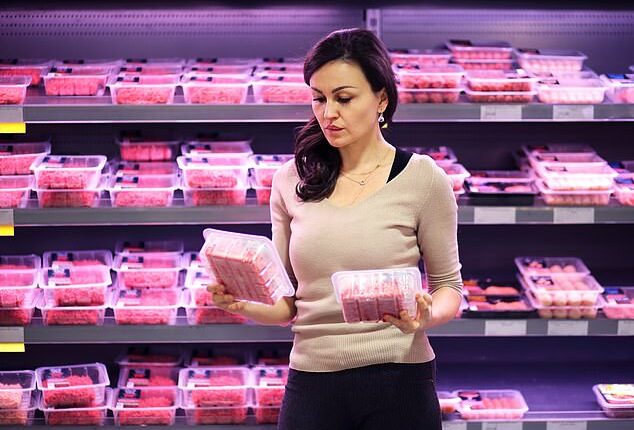Advisers to Robert F Kennedy Jr fear cloned meat and animal breeding could become a divisive issue inside the Make America Healthy Again movement.
The Daily Mail understands that the use of cloned animals in the US food supply is seen as a ‘complex problem’ among Kennedy allies.
The topic gained renewed attention this week when Canada announced it would allow cloned meat products to be sold in supermarkets without any disclosure – a practice the US has quietly permitted for nearly two decades.
Some close allies of the health secretary worry the issue could spark tensions within the movement, particularly among its tech-forward members who align with Elon Musk and view cloned breeding as a potentially valuable tool for boosting sustainability and environmental outcomes, the Daily Mail understands.
For now, the Trump Administration’s Health Department (HHS) has taken no official stance on cloned-animal products in the food supply.
Sources close to Kennedy say the department is not ruling out weighing in later on what they describe as an ‘interesting issue.’
HHS is currently deferring all policy authority to the Food and Drug Administration (FDA), which sits under Kennedy’s leadership.

The renewed interest in cloned meat had many Americans shocked to learned that the US has allowed cloned meat to be in stores for nearly two decades, as the Food and Drug Administration (FDA) approved it in 2008 after a seven-year study
The Department of Agriculture estimated there were around 600 cloned animals in 2008, primarily cattle, which are used for breeding rather than direct slaughter.
It is currently unknown how many cloned livestock animals are in the US.
A 2010 Congressional Research Service report suggested that the number of meat products from these clones entering the food supply could be in the hundreds or even thousands.
‘Those numbers would amount to a small fraction of the total number of US livestock slaughtered,’ the report noted – a figure that pales in comparison to roughly 150 million cows and hogs killed each year.
Nevertheless, the offspring of cloned animals may still reach supermarket shelves, and their products are not legally required to be labeled.
This means Americans could be unwittingly consuming meat or dairy derived from a clone’s lineage without ever knowing.
‘Because of regulations, producers generally disclose only what is required by law and any additional information that helps promote sales – for example, ‘non-GMO,” Wujie Zhang, a chemistry professor at the Milwaukee School of Engineering and who deals with stem cell-based medicines and tissue engineering, told the Daily Mail.
‘I would expect sales to change if the meat source were indicated as coming from cloned animal.
‘As a consumer myself, I don’t think we can really control what comes to the market, but it’s more important to know what we’re getting and to have a choice. If labeled, I may buy.’

The FDA has not released any new information or data regarding the practice. It is unclear how many cloned animals are currently being used in US livestock or how much of its offspring’s product are hitting shelves, but it could be hundreds or thousands of animals

This means Americans may be unwillingly consuming meat from a clone’s byproduct without knowing. And in the age of Make America Healthy Again (MAHA) – a movement led by Health Secretary Robert F. Kennedy Jr. – many are outraged
While many have been unknowingly consuming it, the FDA did allow an extended public opinion period before changing the policy in 2008 and released a nearly 1,000-page study on human health and animal effects.
The report found cloned animals suffered more frequent health issues.
The 2010 report said: ‘While the types of animal health problems observed in cloned animals are no different than those found with other assisted reproductive technologies, these problems appear more frequently in cloning than in the other technologies.
‘Such problems include late gestational complications in the surrogate mothers, and increased risk of mortality and morbidity in calf and lamb clones.’
The FDA found that livestock clones as a group tend to have more health problems and death rates at or right after birth.
However, the risk assessment added that most animals surviving the neonatal period appear to grow and develop normally.
Regarding any risk to humans, the FDA concluded that meat and milk from clones or their offspring pose no additional food consumption risks compared with products from conventionally bred animals.
The agency has not released any new information or data regarding the practice. It is unclear how many cloned animals are currently being used in US livestock or how much of its offspring’s product are hitting shelves.

Wujie Zhang, a chemistry professor at the Milwaukee School of Engineering and who deals with stem cell-based medicines and tissue engineering, told the Daily Mail the FDA may have foregone labeling cloned meat as it could turn away consumers

The FDA has found that meat from a clone’s offspring is perfect safe to eat and has little difference in makeup
The first animal ever cloned was a sheep named Dolly and she was born in 1996, not to much fanfare as many worried about the long-term effects of biotechnology.
The process includes taking a tissue biopsy from an animal that has been deemed elite and has preferable traits and creating a cell culture in a lab.
Then through a somatic cell nuclear transfer, a cloned embryo is created and transplanted into a recipient animal, who then births the ‘clone.’
Kennedy and his clan of health-obsessed crusaders may not have publicly commented on the US’ usage of cloned meat, but the 71-year-old has taken a stance on a similar supermarket product: Cultivated meat, or lab-grown meat.
In 2022, years before taking the top health spot in the US, he criticized the product as extremely unhealthy and said the American public was being misled to believe it was healthy.
‘The industry’s fake meat is just another name for ultra-processed food,’ he tweeted in November 2022. ‘[It’s] full of GE and pesticide-laden ingredients designed to look as much like meat as possible.’
He claimed experts were ‘using strategies to position it as a healthy alternative for natural meat,’ without fully looking at the picture.
RFK Jr. has been a strong proponent for natural foods and opposed to processed foods, especially ultra-processed and genetically modified organisms (GMOs).
Since taking office, the controversial pick has been on a crusade to Make America Healthy Again, including declaring war on food dyes and added sugar, which he called ‘poison.’
The Daily Mail has reached out to RFK Jr., HHS, and the FDA for comment.









